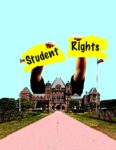In an age where our attention spans are shorter than ever, lengthy video essays on YouTube are thriving. Ranging in length from 30 minutes to three hours or longer, video essays are a unique form of video that succeeds in retaining viewership, generating money and entertaining audiences.
The typical video essay takes on one of two basic styles: either the creator is trying to prove a point and argues it in a format resembling a traditional essay or the video is an exploration of a topic with no concrete stance.
Regardless of which style the creator takes, video essays are paired with a curated showing of images and videos that support the topic. In a feature on the power of video essays, Evercast, a video collaboration platform, dove into the financial side of creating this type of video.
Using popular YouTube creator Evan Puschak, known as Nerdwriter1 on the platform, as an example, they discovered that he was making upwards of $2,000 per video on viewership alone.
Puschak, who makes film-related video essays, his most popular video was an analysis of the film Parasite. Puschak used to average one video per week – totaling $20,000 per year. On Youtube, creators can earn 0.2 cents to 0.12 cents per view.
Additionally, every 1,000 viewers that watch at least 30 seconds of an ad featured on a given video generate further revenue for the creator.
Often, creators will have a brand sponsor their videos as well – brands range anywhere from mental health platform BetterHelp to audiobook service Audible.
This is all to say that video essays do extremely well on the platform and many creators see the benefit of this. In an article by Vox, Terry Nguyen explains that during the COVID-19 pandemic, many people who then found themselves at home turned to video essays to unwind or act as a source of information on a particular topic.
Video essays are also more flexible, engaging and digestible than traditional academic essays to modern audiences. Somebody who is interested in a topic may engage with a video essay in the same way one would a podcast or audiobook, making it useful for those who are auditory learners.
However, if video essays are succeeding in generating viewership, bringing in money and satisfying audience needs, do they have the potential to be used in an academic setting or rival the traditional academic essay?
Andrea Austin, an associate professor in English and film studies at Wilfrid Laurier University, first touched on the essay itself, explaining that it is its own genre of writing.
“It’s part of what we call writing in rhetoric. In terms of rhetoric, the purpose of an essay was to make an argument and then support it as you make a reasoned argument. And then you’re supporting it and then you come to your conclusion. Whereas other kinds of writing we would call it non-fiction prose.”
While some video essays follow an essay format, they do not necessarily mirror the academic essay.
“I think that there’s a time and a place for it,” said Katherine Bell, another associate professor in English and film studies at Laurier, when asked if video essays have the potential to replace academic essays.
“When you write an essay, you do the research, you watch the movie, you have the ideas, and you put them on paper. With video essays, you’re introducing all kinds of practical barriers,” said Dru Jeffries, a lecturer of film and cultural studies at Laurier.
The use of creative assignments outside of traditional essays in university classrooms is not unheard of. Many courses across varying faculties allow students to take a more creative route when tackling assignments.
When examining the use of video essays as an assignment in an academic setting, much like any other assignment, the role of misinformation, plagiarism and Chat GTP must be considered.
Youtube is a major contributor to the spread of misinformation. While the platform does have active measures in place to ensure content that contributes to fake news or misinformation is removed, such as their community guidelines and external evaluators, they are only concentrated when it comes to videos that cover topics such as politics, international news and public health.
An hour-long video essay a creator made about corporate greed in our society is not being rigorously fact-checked or reviewed for use of AI.
While there are bound to be incorrect facts and statements in video essays we enjoy for entertainment, if video essays make their way into classrooms, will this be the same case?
Austin said it would be easier to detect the use of AI in a conventional print essay than in a video essay. She explained that AI is not at a level quite yet where a video essay style could be recreated solely through AI. “I know none of my students have that kind of experience to do an entire video essay in AI,” Austin said.
Just because a video essay in its full capacity is not infiltrating university syllabuses just yet, does not mean they do not serve a purpose outside of general entertainment.
“I would assign a video essay response to an article, perhaps. I’m not sure that it would replace, but [it could] maybe enhance the possibilities for different kinds of responses,” said Bell, regarding the use of video essays as a teaching tool.
“I wouldn’t look to YouTube,” Jeffries said about using video essays for academic research. “I would look to other resources because there are a lot of academics who are pivoting from traditional written work to more of a video-based approach.”
While regulation surrounding the information featured in these videos as well as the use of AI would need to be refined.
In the future, we could see entire courses dedicated to the creation or study of video essays.
Some institutions, such as Wesley College and Western Washington University, already have classes dedicated to the study and production of video essays. For now, I would suggest browsing video essays on YouTube to find one that fits your interests and area of study. Though you may not be able to directly utilize it for an assignment just yet, the content in the video may give you a new perspective on a topic you believed you were an expert on.






